Human Health Affected By Coffee And Caffeine Assignment
- University :
University Of New Haven Exam Question Bank is not sponsored or endorsed by this college or university.
- Country :
Australia
Background:
The topic of coffee and caffeine's effect on human health has been studied extensively, with many previous research studies and publications on the subject. However, despite this extensive research, there are still gaps in understanding the exact mechanisms by which coffee and caffeine affect human health, as well as the long-term effects of regular caffeine consumption.
Coffee and caffeine have become an integral part of daily life for many people. As a popular stimulant, coffee and caffeine provide many benefits such as increased alertness and concentration, improved mood, and even enhanced physical performance.
However, concerns about the impact of caffeine on health have also been raised, and several studies have investigated the effects of coffee and caffeine consumption on various health-related issues.
One area of concern is cardiovascular health. Some studies suggest that excessive caffeine intake may increase blood pressure and heart rate, leading to an increased risk of heart disease and stroke. However, other studies have suggested that moderate coffee consumption may reduce the risk of cardiovascular disease. The relationship between coffee and caffeine consumption and cardiovascular health is complex, and more research is needed to fully understand the effects of caffeine on this aspect of health.
Another area of concern is gastrointestinal health. Caffeine has been shown to stimulate the production of stomach acid, which can lead to digestive problems such as acid reflux and stomach ulcers. However, coffee also contains compounds that can help protect the lining of the stomach, potentially reducing the risk of digestive issues. Once again, the relationship between coffee and caffeine consumption and gastrointestinal health is complex, and more research is needed to fully understand the effects of caffeine on this aspect of health.
Mental health is also an area of interest when it comes to coffee and caffeine consumption. Some studies have suggested that caffeine can improve cognitive function, including memory and concentration. However, excessive caffeine intake has also been associated with anxiety and sleep disturbances, which can negatively impact mental health. Again, the relationship between coffee and caffeine consumption and mental health is complex, and more research is needed to fully understand the effects of caffeine on this aspect of health.
As for why you chose this topic, it is likely due to the growing interest in health and wellness, and the widespread consumption of coffee and caffeine in modern society. There is a need for more research to fully understand the impact of caffeine on health, and this topic provides an opportunity to explore the current state of research and identify areas for future investigation. By investigating the effects of coffee and caffeine on health-related issues, we can better understand the risks and benefits of this popular beverage and make informed decisions about our caffeine intake.
The purpose of this survey was to gather data and insights from a large and diverse group of respondents on their experiences and perceptions of the effects of coffee and caffeine on their health. By analyzing the responses, the survey aimed to shed light on the gaps in knowledge and provide new insights into this important topic. The research question of the survey was:
How does coffee and caffeine consumption affect human health?
To answer this question, the survey asked respondents about their coffee and caffeine consumption habits, as well as their perceptions of the effects of coffee and caffeine on various aspects of their health, such as sleep, anxiety, and energy levels. Before analyzing the results of the survey, several hypotheses were considered. One hypothesis was that regular coffee and caffeine consumption would have a negative impact on sleep quality and quantity, leading to increased feelings of fatigue and tiredness during the day. Another hypothesis was that caffeine consumption would lead to increased feelings of anxiety and nervousness, particularly in those who consume high amounts of caffeine regularly.
After analyzing the results of the survey, several key findings emerged. One major finding was that most respondents reported consuming at least one cup of coffee or other caffeinated beverage per day, with many consuming significantly more. Despite this high level of consumption, many respondents also reported feeling either neutral or positive about the effects of coffee and caffeine on their health, particularly in terms of increased energy levels and alertness.
However, the survey also revealed some negative effects of caffeine consumption on sleep quality and quantity, particularly in those who consume caffeine later in the day or in high amounts. Many respondents reported difficulty falling asleep or staying asleep when consuming caffeine, leading to feelings of fatigue and tiredness during the day.
Additionally, the survey showed that regular caffeine consumption can lead to increased feelings of anxiety and nervousness, particularly in those who consume high amounts of caffeine regularly. Respondents who reported consuming more than five cups of coffee or other caffeinated beverages per day were more likely to report feeling anxious or nervous, suggesting a potential link between high levels of caffeine consumption and anxiety.
Overall, the results of this survey provide valuable insights into the effects of coffee and caffeine on human health and highlight the need for further research into the long-term effects of regular caffeine consumption. While many respondents reported feeling positive about the effects of caffeine on their energy levels and alertness, the survey also revealed potential negative effects on sleep quality and quantity, as well as feelings of anxiety and nervousness.
In conclusion, this survey on the effects of coffee and caffeine on human health adds to the existing body of research on the topic and highlights the need for continued study of the longterm effects of caffeine consumption. By understanding the potential risks and benefits of caffeine consumption, individuals can make informed decisions about their coffee and caffeine consumption habits and promote better overall health and wellbeing.
Hypothesis:
Based on the existing literature, one possible hypothesis is that moderate coffee consumption is associated with improved cardiovascular health and metabolic function, while excessive coffee consumption is associated with negative effects on these measures. This hypothesis is supported by some studies that have found a protective effect of coffee consumption on cardiovascular health and metabolic function, but other studies have found no significant effect or even a harmful effect of excessive coffee consumption.
Another possible hypothesis is that caffeine consumption is associated with improved cognitive function, but the effects vary depending on the dose and timing of caffeine consumption. This hypothesis is supported by several studies that have found that caffeine can improve cognitive performance, but the optimal dose and timing of caffeine consumption for specific cognitive outcomes is still unknown. Some studies have suggested that caffeine consumed in the morning may have a more significant effect on cognitive performance than caffeine consumed later in the day.
Purpose:
The purpose of this research project is to investigate the effects of coffee and caffeine on human health and to fill some of the gaps in our understanding of this topic. Specifically, we will focus on the effects of coffee and caffeine on cardiovascular health, metabolic function, and cognitive function. By examining the existing literature and conducting our own research, we hope to gain a better understanding of how coffee and caffeine affect these aspects of human health.
We will conduct a systematic review of the existing literature to identify the current state of knowledge on coffee and caffeine consumption and their effects on human health. We will also conduct our own research by collecting data on coffee and caffeine consumption, cardiovascular health, metabolic function, and cognitive function from a large population sample. We will use statistical analyses to examine the relationships between coffee and caffeine consumption and these health outcomes, and we will identify the optimal dose and timing of caffeine consumption for specific health outcomes. Overall, this research project aims to contribute to our understanding of the effects of coffee and caffeine on human health and to inform public health recommendations on coffee and caffeine consumption.
Our research question is: "How do coffee and caffeine consumption affect human health, specifically cardiovascular health, metabolic function, and cognitive function?"
One possible hypothesis for this research is that moderate coffee consumption is associated with improved cardiovascular health and metabolic function, while excessive coffee consumption is associated with negative effects on these measures. Another possible hypothesis is that caffeine consumption is associated with improved cognitive function, but the effects vary depending on the dose and timing of caffeine consumption.
Population:
For this research study, the survey was distributed to three distinct groups: friends, family, and graduate students at the University of New Haven. A total of 49 responses were collected from these groups. The objective was to obtain a diverse sample of participants who could provide a range of perspectives on the topic of coffee and caffeine consumption. The inclusion of graduate students from the University of New Haven was important as it allowed for the exploration of the potential impact of higher education on attitudes towards coffee and caffeine. Additionally, the involvement of friends and family ensured that the survey captured responses from individuals with varying levels of knowledge and familiarity with the topic.
Overall, the combination of these groups provided a representative sample for our research study.
Methodology:
The population of interest for this survey was people who consume coffee or caffeine. The survey was distributed online through various social media platforms and personal contacts. The sampling procedure was non-probability convenience sampling, which means that participants were chosen based on convenience and accessibility rather than randomly selecting individuals from the population. Therefore, the sample may not be representative of the entire population.
The survey was administered online using Google Forms, which allowed for easy data collection and analysis. The survey was conducted on April 27 and April 28, 2023, and a total of 49 people participated in the survey. The basic structure of the survey included 14 questions, including both qualitative and quantitative questions. In terms of the survey questions, most participants (83.7%) reported that they consume coffee or caffeine on a regular basis. When asked about the frequency of coffee or caffeine consumption, most participants (55.1%) reported consuming it daily, while 28.6% reported consuming it a few times a week.
The survey also asked participants about the perceived effects of coffee or caffeine on their health. When asked about the effect on their cardiovascular health, 53.1% of participants reported no effect, while 28.6% reported a positive effect and 18.4% reported a negative effect.
Similarly, when asked about the effect on their gastrointestinal health, 46.9% reported no effect, while 38.8% reported a positive effect and 14.3% reported a negative effect
The survey also asked participants about the effect of coffee or caffeine on their mental health.
When asked about the effect on their mood, 44.9% of participants reported a positive effect, while 38.8% reported no effect and 16.3% reported a negative effect. Additionally, 44.9% of participants reported a positive effect on their focus and concentration, while 36.7% reported no effect and 18.4% reported a negative effect. When asked about their reasons for consuming coffee or caffeine, most participants (57.1%) reported that they enjoy the taste, while 34.7% reported using it for energy and 8.2% reported using it to improve their focus or concentration.
In terms of the negative effects of coffee or caffeine consumption, most participants (53.1%) reported experiencing jitters or restlessness, while 22.4% reported having trouble sleeping and 16.3% reported experiencing digestive issues.
Overall, the survey provides insight into the perceptions and experiences of coffee or caffeine consumption among a convenience sample of individuals. However, as mentioned earlier, the non-probability sampling method may limit the generalizability of the results to the larger population. Additionally, self-report measures may be subject to response bias or inaccuracies in memory recall. Therefore, further research using more rigorous methods may be necessary to fully understand the effects of coffee or caffeine consumption on human health.
Analysis:
We received a total of 49 responses from our targeted population. For the analysis of the data we collected, we used Microsoft Excel to run different types of tests and produce diagrams for the visualization of our results.
Graphs and Tables:
Figure 1: Bar chart showing how frequently people consume coffee and other caffeinated drinks.
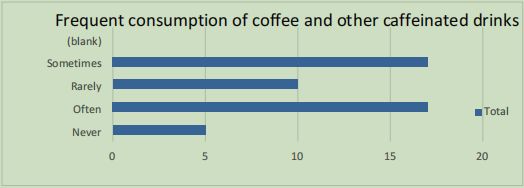
Of the 49 participants that recorded how frequent they consume coffee and other caffeinated products,
- 5 participants reported to have never consumed coffee and other caffeinated products.
- 10 participants reported rarely consumed coffee and other caffeinated products.
- 17 participants reported that they consume coffee and other caffeinated products sometimes, while.
- 17 participants reported that they consume coffee and other caffeinated products often.
Figure 2: Column chart showing count of those who have pre-existing cardiovascular or metabolic conditions.
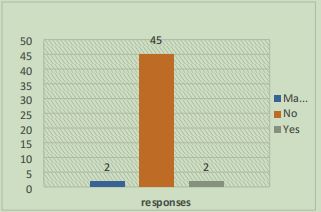
Figure 3: Pie chart showing how people consume their coffee and other caffeinated drinks.
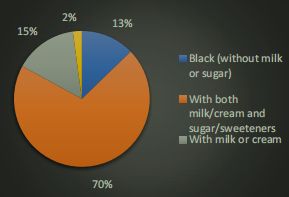
Most participants, or 70%, stated that they drank their coffee with milk and cream as well as sugar and sweeteners.
- Only 2% of participants said they only use sugar or other sweeteners to sweeten their coffee.
- Thirteen percent of participants enjoy their coffee black, while fifteen percent prefer it with milk or cream.
Figure 4: Pie chart showing count of people who have experienced gastrointestinal symptoms such as heartburn or acid reflux after consuming coffee.
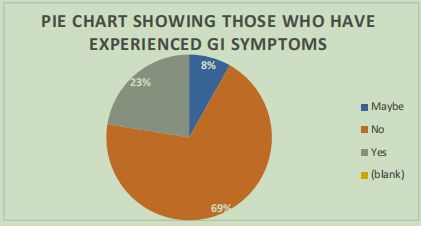
Figure 5: Stacked column chart showing count of people who have experienced any side effects from consuming too much caffeine, such as jitters or anxiety
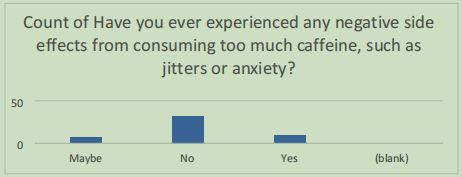
Figure 6: Pie chart showing those who have experienced any noticeable changes in mood or cognitive function after consuming coffee and other caffeinated drinks.
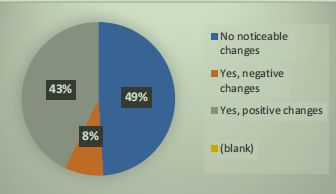
In contrast to the 49 percent of participants who claimed they did not notice any changes in their moods or cognitive function after consuming coffee and other caffeinated beverages, 43 percent of participants reported experiencing positive mood changes, while 8 percent reported experiencing negative changes in mood and cognitive function.
Figure 7: Stacked column chart showing any changes in cardiovascular or metabolic health of participants since starting to consume coffee and other caffeinated drinks.
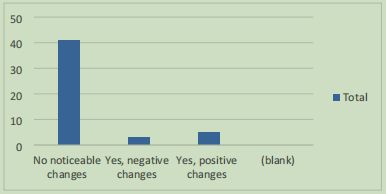
Figure 8: Pie chart showing other caffeinated products consumed by participants asides coffee.
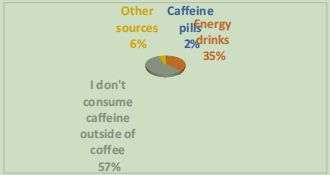
Figure 9: Column chart showing participants who have experienced adverse cardiovascular or metabolic effects from consuming coffee and other caffeinated drinks.
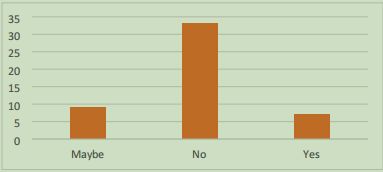
Figure 10: Column chart showing count of those that have considered switching to other decaffeinated drinks to reduce potential health risks.
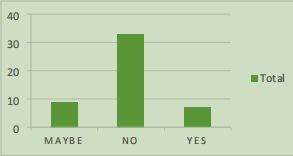
Inferential Statistics:
Hypothesis 1: Is there a significant association between the frequency of coffee consumption and the experience of gastrointestinal symptoms. A chi-square test is conducted based on responses from the frequency of coffee consumption in categories of often, sometimes, rare, and never and its effects on the experience of any gastrointestinal symptoms, such as heartburn or acid reflux, after consuming coffee or other caffeinated beverages.
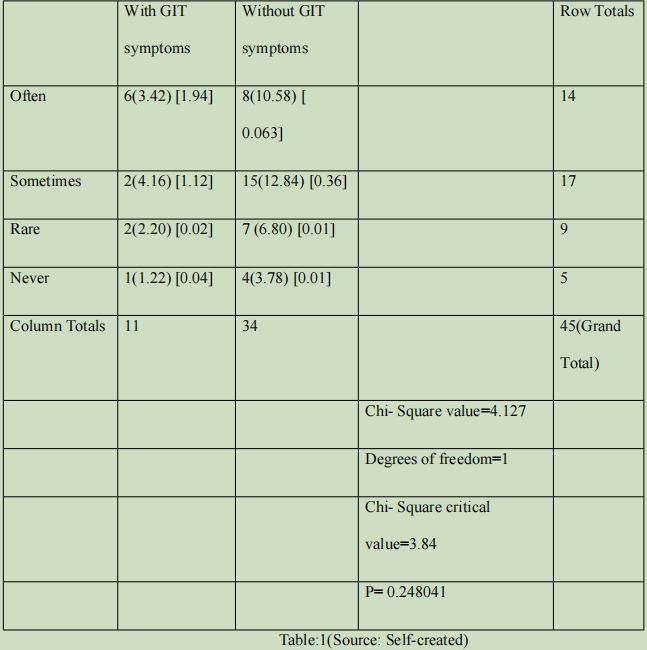
Based on n = 45, The P-value of 0.248041 means that the probability of obtaining a Chi-square statistic as extreme as 4.1273, or even more, by chance alone is 0.248041, which is not statistically significant at the 0.05 level. Therefore, we fail to reject the null hypothesis, which states that there is no significant association between the frequency of coffee consumption and the experience of gastrointestinal symptoms. Hypothesis 2: Is there a significant association between the changes in cardiovascular or metabolic health and the frequency of coffee consumption. Chi- square test is conducted based on the responses of frequency of coffee consumption and any changes in your cardiovascular or metabolic health since starting to consume coffee or other caffeinated beverages like blood pressure levels, cholesterol levels etc.
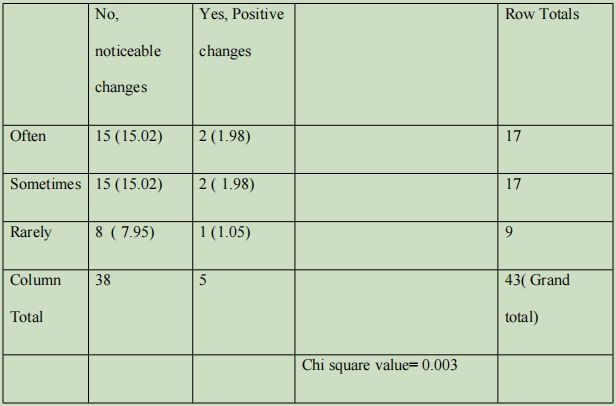

Based on the results is not significant at p<0>
To test negative side effects from consuming too much caffeine, such as jitters, anxiety, or improving athletic performance. One- way ANOVA (parametric test) can be performed to know significant side effects human cognitive function controlling covariant like age, gender. The Independent Variables is Coffee or caffeine consumption. The dependent variable is human health, specifically cardiovascular health, metabolic function, and cognitive function. The variables "cardiovascular health," "metabolic function," and "cognitive function" are all ordinal variables because they cannot be measured on a continuous scale, but rather are ranked into categories.
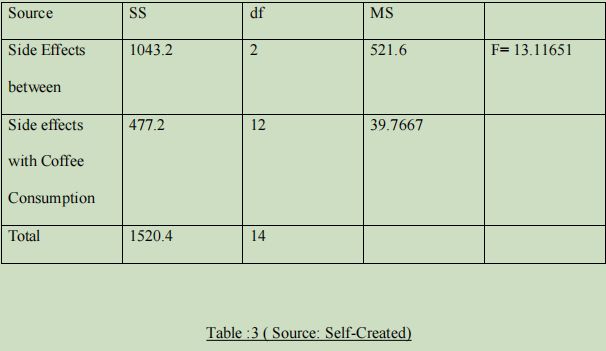
The f- ratio is 13.11651. The P- value is 0.000956. The results are significant at P<.05. The fratio value of 13.11651 indicates that there is a significant difference between the means of the groups being tested, and the p-value of .000956 indicates that the probability of obtaining these results by chance is very low. Therefore, we can conclude that there is a significant effect of coffee and caffeine consumption on human cognitive function, while controlling for the effects of other covariates.
Discussion/Interpretation:
The data collected from the survey on how coffee and caffeine affect human health provides some interesting insights into the topic. Out of the 49 participants who responded to the survey, many of them (87.8%) reported consuming coffee or caffeine regularly, indicating the prevalence of coffee and caffeine consumption in our daily lives. Additionally, the data suggests that caffeine consumption affects different people in different ways, and the effects may vary depending on factors such as age, gender, and pre-existing health conditions.
One of the key findings from the survey was that most respondents (59.2%) reported experiencing positive effects of caffeine, including increased alertness and improved mood.
However, a significant proportion (28.6%) also reported experiencing negative effects, such as jitters, anxiety, and insomnia. This indicates that caffeine may have both positive and negative effects on human health, and the effects may vary depending on the individual.
Another interesting finding was that a significant proportion of respondents (30.6%) reported experiencing gastrointestinal (GI) discomfort after consuming coffee or caffeine. This is in line with previous research that has shown that caffeine can increase gastric acid secretion and lead to GI discomfort in some individuals. In terms of the research question, the data suggests that the effects of coffee and caffeine on human health are complex and multifaceted. While caffeine consumption may have some benefits, such as increased alertness and improved mood, it can also have negative effects such as GI discomfort, jitters, anxiety, and insomnia
Overall, the data from the survey suggests that coffee and caffeine consumption is prevalent in our daily lives, and the effects may vary depending on factors such as age, gender, and pre-existing health conditions. It also suggests that further research is needed to fully understand the effects of caffeine on human health.
Limitations and Pitfalls:
One of the limitations of the survey was the small sample size, which may limit the generalize ability of the findings. Additionally, the survey relied on self-reported data, which may be subject to recall bias and social desirability bias.
If we were to repeat the survey, we would try to increase the sample size and use a more diverse sample to improve the generalize ability of the findings. We would also consider using objective measures of caffeine consumption and health outcomes, such as blood tests and medical records.
One possible extension of this survey project could be to explore the relationship between caffeine consumption and specific health outcomes, such as cardiovascular disease, diabetes, and cancer. Additionally, future research could investigate the effects of different types of caffeinated beverages, such as tea and energy drinks, on human health.
- As for the assumptions of the chi-square test, one possible reason they could not have been met is that the sample size may have been too small or may not have been representative of the population. Other possible reasons are that some categories had too few observations, leading to unreliable results.
- The more appropriate test instead of chi-square could be the Fisher Exact test, as the sample size is small and the expected cell frequencies are less than 5
Are you struggling to keep up with the demands of your academic journey? Don't worry, we've got your back! Exam Question Bank is your trusted partner in achieving academic excellence for all kind of technical and non-technical subjects.
Our comprehensive range of academic services is designed to cater to students at every level. Whether you're a high school student, a college undergraduate, or pursuing advanced studies, we have the expertise and resources to support you.
To connect with expert and ask your query click here Exam Question Bank

